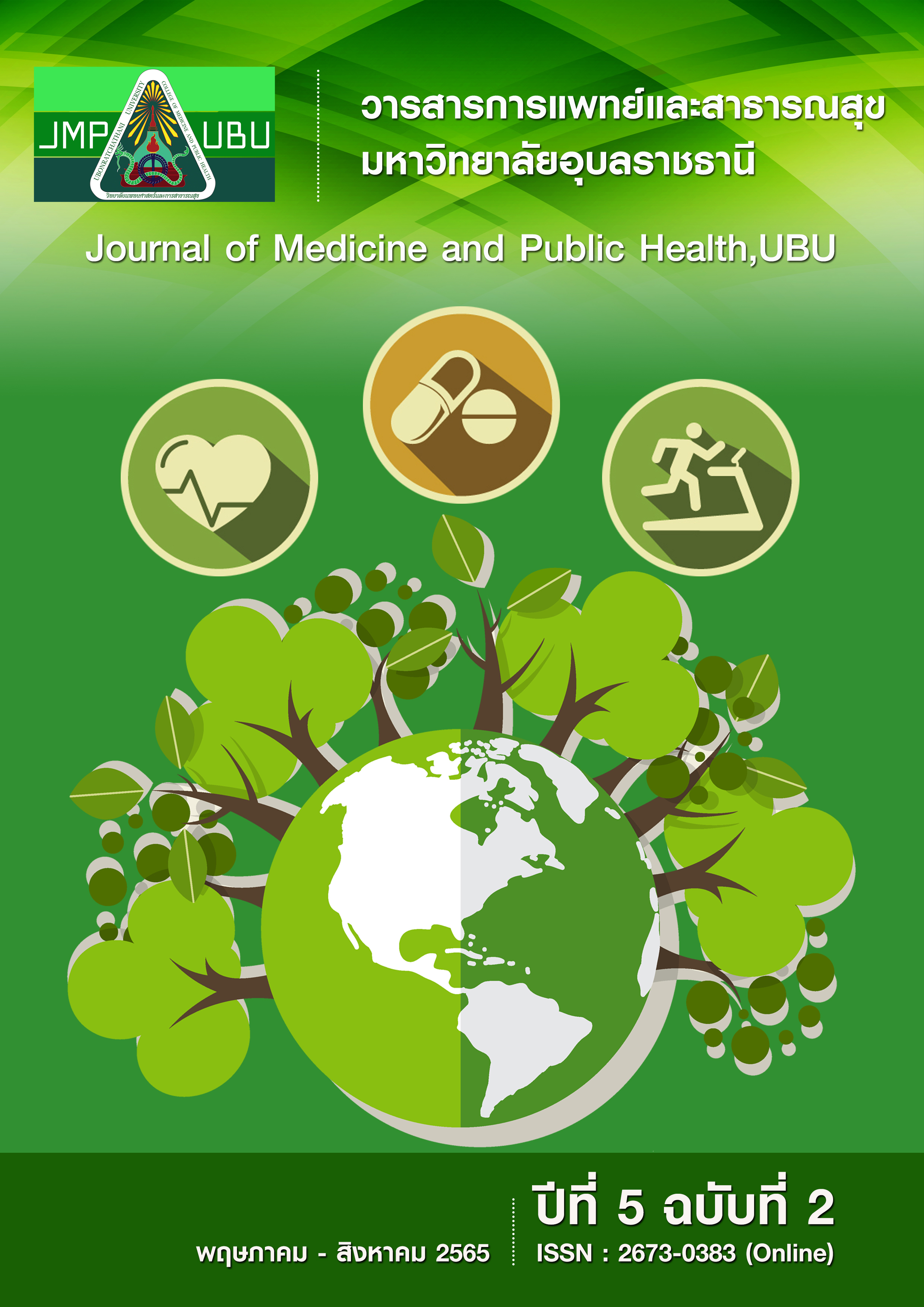ความรอบรู้ด้านสุขภาพจิตและปัจจัยที่สัมพันธ์กับภาวะซึมเศร้าในสถานการณ์โรคติดเชื้อไวรัสโคโรนา 2019 (โควิด-19) ของนิสิตระดับปริญญาตรี มหาวิทยาลัยแห่งหนึ่งในจังหวัดชลบุรี
คำสำคัญ:
ความรอบรู้ด้านสุขภาพ , ซึมเศร้า , โรคโควิด-19 , วัยรุ่น , นักศึกษาบทคัดย่อ
การวิจัยเชิงพรรณนาแบบภาคตัดขวางในครั้งนี้เพื่อศึกษาความรอบรู้ด้านสุขภาพจิตและปัจจัยที่สัมพันธ์กับภาวะซึมเศร้าในสถานการณ์การแพร่ระบาดของโรคโควิด-19 ของนิสิตระดับปริญญาตรี มหาวิทยาลัยแห่งหนึ่งในจังหวัดชลบุรี กลุ่มตัวอย่างคือ นิสิตระดับปริญญาตรี จำนวน 711 คน เก็บข้อมูลระหว่างเดือนกรกฎาคม – สิงหาคม พ.ศ. 2564 เครื่องมือที่ใช้ในการวิจัยคือแบบสอบถามออนไลน์ วิเคราะห์ข้อมูลโดยใช้สถิติพรรณนา วิเคราะห์หาความสัมพันธ์โดยใช้สถิติไคสแควร์และฟิชเชอร์ ผลการวิจัยพบว่า กลุ่มตัวอย่างเป็นนิสิตเพศหญิง ร้อยละ 78.62 ด้านความรอบรู้ด้านสุขภาพจิต พบว่า ความรู้เกี่ยวกับสุขภาพจิตและความผิดปกติทางจิตอยู่ในระดับปานกลาง ร้อยละ 56.25 ความเชื่อเกี่ยวกับสุขภาพจิตและความผิดปกติทางจิตในระดับดี ร้อยละ 90.30 ความสามารถในการรับรู้ปัญหา การป้องกัน และการจัดการปัญหาทางจิตในระดับดี ร้อยละ 89.17 แรงสนับสนุนทางสังคมด้านครอบครัวและด้านเพื่อนระดับมาก ร้อยละ 70.04 และ 78.48 ตามลำดับ โดยนิสิตเข้าข่ายภาวะซึมเศร้า ร้อยละ 32.91 การวิเคราะห์ความสัมพันธ์กับภาวะซึมเศร้าของนิสิตระดับปริญญาตรี พบว่า สัมพันธภาพครอบครัว แรงสนับสนุนทางสังคมด้านครอบครัวและด้านเพื่อน และความสามารถในการรับรู้ปัญหา การป้องกัน และการจัดการปัญหาทางจิตมีความสัมพันธ์กับภาวะซึมเศร้าในสถานการณ์การแพร่ระบาดของโรคโควิด-19 อย่างมีนัยสำคัญทางสถิติที่ 0.05 ดังนั้นสถานศึกษาและหน่วยงานที่เกี่ยวข้องควรมีการคัดกรองภาวะซึมเศร้าให้กับนิสิตและจัดให้มีกิจกรรมเพื่อการดูแลนิสิตที่เข้าข่ายภาวะซึมเศร้า โดยมุ่งเน้นในเรื่องสัมพันธภาพกับครอบครัว ความรอบรู้ด้านสุขภาพจิต และแรงสนับสนุนทางสังคมด้านครอบครัวและเพื่อนผ่านระบบออนไลน์เพื่อให้นิสิตมีสุขภาพจิตที่ดีต่อไป
Downloads
เอกสารอ้างอิง
World Health Organization. WHO Coronavirus Disease (COVID-19) Dashboard 2021 [online]. [cited 2021 March 5]. Available from: https://covid19.who.int/table.
กรมสุขภาพจิต. ข้อมูลการประเมินสุขภาพจิตคนไทย นนทบุรี: กระทรวงสาธารณสุข; 2565 [อินเตอร์เน็ต]. [สืบค้นเมื่อ 5 มีนาคม 2565]. แหล่งข้อมูล: https://checkin.dmh.go.th/dashboard/dash01.php.
กรมสุขภาพจิต. สถิติยอดคนไทย‘ฆ่าตัวตายพุ่ง เตรียมตั้งทีม ฉก. ส่องโซเชียลสกัด นนทบุรี: กระทรวงสาธารณสุข; 2563 [อินเตอร์เน็ต]. [สืบค้นเมื่อ 5 มีนาคม 2565]. แหล่งข้อมูล: https://www.dmh.go.th/news-dmh/view.asp?id=30430.
โปรยทิพย์ สันตะพันธุ์, ศิริญพร บุสหงส์, เชาวลิต ศรีเสริม. ภาวะซึมเศร้าในวัยรุ่น: บทบาทพยาบาล. วารสารเกื้อการุณย์. 2562;26(1):187-99.
เทื้อน ทองแก้ว. การออกแบบการศึกษาในชีวิตวิถีใหม่ : ผลกระทบจากการแพร่ระบาด COVID-19. คุรุสภาวิทยาจารย์. 2563;1(2):1-10.
Thomas E. Coronavirus: Impact on young people with mental health needs [online]. [cited 2021 March 5]. Available from: https://www.youngminds.org.uk/media/xq2dnc0d/youngminds-coronavirus-report-march2020.pdf
ดิลฉัตร ซุสสุโพวา. วันสุขภาพจิตโลก 2020 ประเทศไทย: องค์การยูนิเซฟ 2563 [อินเตอร์เน็ต]. [สืบค้นเมื่อ 5 มีนาคม 2565]. แหล่งข้อมูล: https://uni.cf/3tUEeBS.
ณัฐสุดา เต้พันธ์, ปิยวรรณ วิเศษสุวรรณภูมิ, ณัฐทร พิทยรัตน์เสถียร, ดุษฎี จึงศิรกุลวิทย์. เข้าใจโรคซึมเศร้าในวัยรุ่น กรุงเทพฯ: จุฬาลงกรณ์มหาวิทยาลัย 2562 [อินเตอร์เน็ต]. [สืบค้นเมื่อ 5 มีนาคม 2565]. แหล่งข้อมูล: https://www.chula.ac.th/cuinside/17693/.
นิตยา มณีวงศ์. พฤติกรรมทางวัฒนธรรมนักศึกษาในยุคไทยแลนด์ 4.0. วารสารสารสนเทศ. 2561;17(2):1-8.
Jorm AF. Mental health literacy: empowering the community to take action for better mental health. American psychologist. 2012;67(3):231.
กระทรวงสาธารณสุข. สถานการณ์ COVID-19 ในประเทศไทย [อินเตอร์เน็ต]. [สืบค้นเมื่อ 5 มีนาคม 2565]. แหล่งข้อมูล: https://ddc.moph.go.th/covid19-dashboard/?dashboard=analysis-province.
ศรีประไพ อินทร์ ชัยเทพ, สิริอร พัวศิริ, มณีรัตน์ พันธุ์สวัสดิ์, ประภา ศรีทุ่งมีผล, วินัย รอบคอบ. การพัฒนาตัวบ่งชี้การรู้เท่าทันสุขภาพจิตสำหรับ ประชาชนทั่วไป. วารสารวิทยาลัยพยาบาลบรมราชชนนี. 2561;10(2):97-109.
Best WJ. Research in Education. New Jersey: Prentice-Hall, Inc.; 1997.
Radloff LS. The CES-D scale: A self-report depression scale for research in the general population. Applied psychological measurement. 1977;1(3):385-401.
อุมาพร ตรังคสมบัติ, วชิระ ลาภบุญทรัพย์, ปิยลัมพร หะวานนท์. การใช้ CES-D ในการคัด กรองภาวะซึมเศร้าในวัยรุ่น. วารสารสมาคมจิตเวชแห่งประเทศไทย. 2540;42(1):2-13.
DeVellis RF. Scale development: Theory and applications. Chapel Hill, USA: Sage publications; 2016.
Islam MA, Low WY, Tong WT, Yuen CW, Abdullah A. Factors associated with depression among University Students in Malaysia: A cross-sectional study. KnE Life Sciences. 2018:415–27-–27.
Chen F, Zheng D, Liu J, Gong Y, Guan Z, Lou D. Depression and anxiety among adolescents during COVID-19: A cross-sectional study. Brain, behavior, and immunity. 2020;88:36.
นันทยา คงประพันธ์. ปัจจัยที่มีผลต่อภาวะซึมเศร้าในวัยรุ่น กรณีศึกษา: มหาวิทยาลัยเทคโนโลยีราชมงคลสุวรรณภูมิ. วารสารสังคมศาสตร์และมานุษยวิทยาเชิงพุทธ. 2563;5(11):302-15.
ดวงใจ วัฒนสินธุ์, สิริพิมพ์ ชูปาน, ภาคิณี เดชชัยยศ. การแก้ปัญหาทางสังคมและภาวะซึมเศร้าของนักศึกษาพยาบาล. วารสารพยาบาลกระทรวงสาธารณสุข. 2562;29(1):87-99.
นฤมล สมรรคเสวี, โสภิณ แสงอ่อน. ปัจจัยที่สัมพันธ์กับ ภาวะซึมเศร้าใน นักศึกษาพยาบาล วารสารพยาบาลจิตเวชและสุขภาพจิต. 2558;29(3):11-27.
จารุพร ตั้งพัฒนกิจ. ปัจจัยที่ส่งผลต่อการเกิดภาวะซึมเศร้าของวัยรุ่นในเขตจังหวัดชลบุรี. วารสาร มนุษยศาสตร์และสังคมศาสตร์ มหาวิทยาลัยอุบลราชธานี. 2564;12(1):45-65.
ศุภชัย ตู้กลาง, อรพรรณ ทองแตง, ธีรศักด์ สาตรา, ภัทรายุตวรรตน์. ปัจจัยที่มีอิทธิพลต่อภาวะซึมเศร้าของนักเรียนวัยรุ่นตอนต้นในโรงเรียนขยายโอกาสทางการศึกษา จังหวัดสมุทรสาคร. วารสารสมาคมจิตแพทย์แห่งประเทศไทย 2555;57(3):283-94.
ประยูรศรี ศรีจันทร์ และคณะ. ปัจจัยที่มีความสัมพันธ์กับภาวะซึมเศร้าของวัยรุ่นในสถานสงเคราะห์. วารสารพยาบาลศาสตร์. 2563;38(1):86-98.
โสภิณ แสงอ่อน และคณะ. ปัจจัยที่มีอิทธิพลต่อภาวะซึมเศร้าในวัยรุ่นด้อยโอกาสไทยในจังหวัดหนึ่งในภาคกลาง. วารสารการพยาบาลจิตเวชและสุขภาพจิต. 2561;32(2):13-38.
Jorm AF, Korten AE, Jacomb PA, Christensen H, Rodgers B, Pollitt P. "Mental health literacy": a survey of the public's ability to recognise mental disorders and their beliefs about the effectiveness of treatment. Medical journal of Australia. 1997;166(4):182-6.
Jorm AF, Kitchener BA, Kanowski LG, Kelly CM. Mental health first aid training for members of the public. International Journal of Clinical and Health Psychology. 2007;7(1):141-51.
Reavley NJ, McCann TV, Jorm AF. Mental health literacy in higher education students. Early intervention in psychiatry. 2012;6(1):45-52.
Hermans L, Van den Broucke S, Gisle L, Demarest S, Charafeddine R. Mental health, compliance with measures and health prospects during the COVID-19 epidemic: the role of health literacy. BMC public health. 2021;21(1):1-9.
ฤทัยรัตน์ ชิดมงคล และคณะ. ภาวะซึมเศร้าและความรอบรู้ด้านสุขภาพจิตของวัยรุ่น. วารสารการพยาบาล การสาธารณสุขและการศึกษา. 2563;21(2):40-51.
ดาวน์โหลด
เผยแพร่แล้ว
รูปแบบการอ้างอิง
ฉบับ
ประเภทบทความ
สัญญาอนุญาต
ลิขสิทธิ์ (c) 2022 วารสารการแพทย์และสาธารณสุข มหาวิทยาลัยอุบลราชธานี

อนุญาตภายใต้เงื่อนไข Creative Commons Attribution-NonCommercial-NoDerivatives 4.0 International License.
เนื้อหาและข้อมูลในบทความที่ลงตีพิมพ์ในวารสารการแพทย์และสาธารณสุข มหาวิทยาลัยอุบลราชธานี ถือเป็นข้อคิดเห็นและความรับผิดชอบของผู้เขียนบทความโดยตรง ซึ่งกองบรรณาธิการวารสารไม่จำเป็นต้องเห็นด้วย หรือร่วมรับผิดชอบใด ๆ
บทความ ข้อมูล เนื้อหา รูปภาพ ฯลฯ ที่ได้รับการตีพิมพ์ในวารสารการแพทย์และสาธารณสุข มหาวิทยาลัยอุบลราชธานี ถือเป็นลิขสิทธิ์ของวารสารการแพทย์และสาธารณสุข มหาวิทยาลัยอุบลราชธานี กองบรรณาธิการไม่สงวนสิทธิ์ในการคัดลอกเพื่อการพัฒนางานด้านวิชาการ แต่ต้องได้รับการอ้างอิงที่ถูกต้องเหมาะสม






